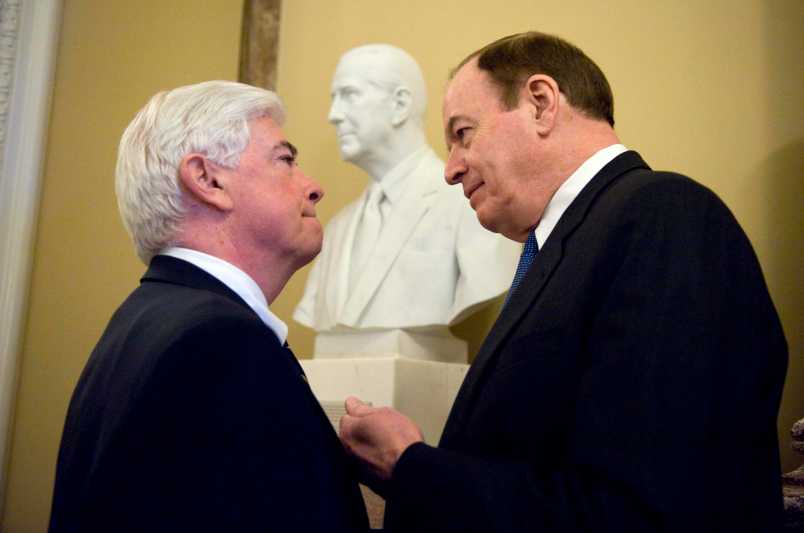Republicans have spent the better part of two years distancing themselves from bailouts and hitting Democrats for supporting them. But given a choice between continuing the 2008 bank bailout and regulating Wall Street, several Republicans voted last night (and almost all of them will ultimately vote) to keep the bailout alive.
Last night, in a scramble to save the bill in the wake of Sen. Scott Brown’s (R-MA) objections to the conference report, Democrats worked with moderate Republicans to figure out a new way to pay for Wall Street reform. What they came up with was pretty simple: end the TARP legislation (i.e., the much-maligned bank bailout) early. Every Republican negotiator on the conference committee objected, some vociferously.
Sen. Judd Gregg (R-NH) called it “fraud on the American people.”
Not to be outdone, Sen. Mike Crapo (R-ID) called it “smoke and mirrors.”
The dispute is budgetary. Republicans want reclaimed TARP funds to be used to pay down deficits. Democrats don’t object, but, with the help of congressional actuaries, figured out a way to save money on the books by ending TARP early. According to CBO, if unspent TARP funds are recalled now, the government would end up with about $11 billion more than they would if they lent the money out and reclaimed it down the line. That $11 billion covers more than half the cost of the financial regulation bill.
Familiarly, Republicans were willing to support an alternative plan, pushed by Gregg, to pay for Wall Street reform with unspent stimulus money. Democrats objected to that.
The Democrats’ unwillingness to keep the bailouts going and use stimulus money to regulate the banks does not, however, seemed to be based on a political calculus that they could tar Republicans with the vote. Most Democrats just preferred the original plan: pay for regulating Wall Street by imposing a fee on the big banks that were the main target of the legislation. And unless they’re biding their time, Democrats have been entirely mum about last night’s vote, the new, TARP-ending provision in the bill and the Republican opposition to it.
But they do now have a new political weapon, if they choose to wield it. Given the choice between ending the bailouts, thereby allowing Wall Street reform to pass, and sustaining TARP in an effort to keep the banks from further regulation, Republicans chose the latter. And soon, most other Republicans will vote down legislation that both imposes stricter rules on Wall Street and lowers the much-loathed TARP legislation into an early grave.










